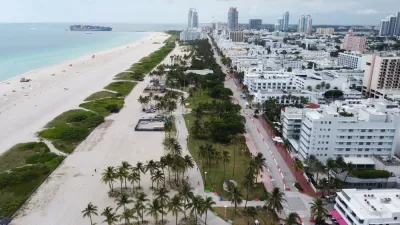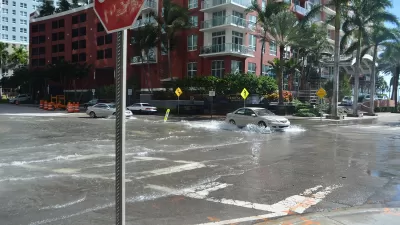Esteban Bovo, chair of the Miami-Dade County Finance Committee, recently provoked the ire of transit advocates when he said that car culture is in the DNA of Miami.
"In response to a request that the Commission prioritize funding for better public transit, Commissioner Bovo displayed an outdated perspective that is out of sync with the needs of our ever-growing community," report Eli Stiers and Leah Weston.
Stiers and Weston "strongly disagree" with Commissioner Bovo's "indifference to the status quo," arguing that Miami residents would chose other modes of transportation if they had more options for doing so. Moreover, Stiers and Weston disagree with Commissioner Bovo’s characterization of immigrants and retirees as seeking the open road by moving to Miami.
Finally, there's also Bovo's support of funding for road construction: "In his final comments on the video, Commissioner Bovo segued into a discussion about road construction, undoubtedly to allocate more millions from the budget for an ever-expanding morass of highways, which are antiquated and overcrowded from the moment they are opened. This kind of thinking is outdated, and this method of addressing transportation in our rapidly-expanding metro area is unsustainable."
Compare this with the leadership in another region of the country, which could also claim to have a car culture in their DNA, Texas. There, new Texas Department of Transportation Executive Director Joe Weber recently called for increased funding for commuter and freight rail projects.
FULL STORY: Miami-Dade County Deserves New Thinking on Transit

Alabama: Trump Terminates Settlements for Black Communities Harmed By Raw Sewage
Trump deemed the landmark civil rights agreement “illegal DEI and environmental justice policy.”

Planetizen Federal Action Tracker
A weekly monitor of how Trump’s orders and actions are impacting planners and planning in America.

The 120 Year Old Tiny Home Villages That Sheltered San Francisco’s Earthquake Refugees
More than a century ago, San Francisco mobilized to house thousands of residents displaced by the 1906 earthquake. Could their strategy offer a model for the present?

In Both Crashes and Crime, Public Transportation is Far Safer than Driving
Contrary to popular assumptions, public transportation has far lower crash and crime rates than automobile travel. For safer communities, improve and encourage transit travel.

Report: Zoning Reforms Should Complement Nashville’s Ambitious Transit Plan
Without reform, restrictive zoning codes will limit the impact of the city’s planned transit expansion and could exclude some of the residents who depend on transit the most.

Judge Orders Release of Frozen IRA, IIJA Funding
The decision is a victory for environmental groups who charged that freezing funds for critical infrastructure and disaster response programs caused “real and irreparable harm” to communities.
Urban Design for Planners 1: Software Tools
This six-course series explores essential urban design concepts using open source software and equips planners with the tools they need to participate fully in the urban design process.
Planning for Universal Design
Learn the tools for implementing Universal Design in planning regulations.
Clanton & Associates, Inc.
Jessamine County Fiscal Court
Institute for Housing and Urban Development Studies (IHS)
City of Grandview
Harvard GSD Executive Education
Toledo-Lucas County Plan Commissions
Salt Lake City
NYU Wagner Graduate School of Public Service




























